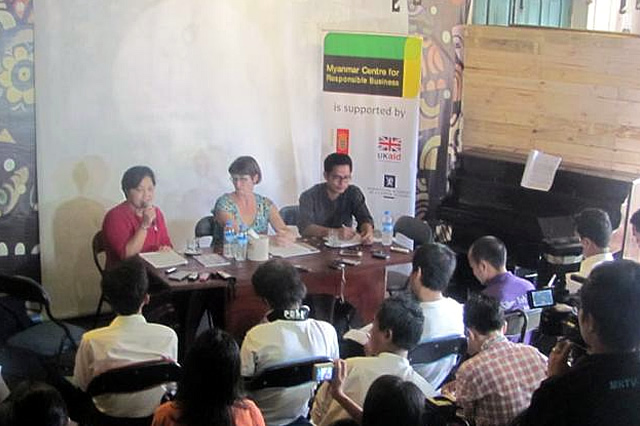MCRB launches ground-breaking impact assessment on Myanmar’s oil and gas sector

The Myanmar Centre for Responsible Business (MCRB) today published its sector-wide impact assessment (SWIA) on Myanmar’s oil and gas (O&G) sector. The SWIA highlights the actual and potential impacts of rapidly expanding O&G investment on Myanmar society
The Myanmar Centre for Responsible Business (MCRB) today published its sector-wide impact assessment (SWIA) on Myanmar’s oil and gas (O&G) sector. The SWIA highlights the actual and potential impacts of rapidly expanding O&G investment on Myanmar society and in particular on human rights in the country and makes recommendations for the Government of Myanmar, businesses and other stakeholders on how to increase positive and reduce negative impacts of the sector.
The Myanmar O&G SWIA and its methodology was developed in collaboration with MCRB’s founding organisations, the Institute for Human Rights and Business (IHRB) and the Danish Institute for Human Rights (DIHR). Future SWIAs on Tourism, ICT and Agriculture are currently being developed.
Launching the report, MCRB Director, Vicky Bowman, said:
"In the space of 12 months, the Myanmar Government has awarded 16 onshore and 20 offshore blocks for oil and gas exploration and production. Under new Myanmar regulations, companies awarded blocks will have to conduct Environmental and Social Impact Assessments (ESIA) according to international standards, and develop appropriate Environmental and Social Management Plans to manage those risks throughout the project cycle. These are new concepts and requirements for Myanmar. The findings of the SWIA should assist companies in conducting their assessments more effectively by prompting them to consider a fuller range of potential impacts in scoping and conducting their assessments, including in particular human rights issues in light of the country’s history and current business climate. The SWIA is intended to support companies, communities and workers to engage on an informed and meaningful basis, taking into account the key concerns about potential impacts of operations in the sector. MCRB stands ready to facilitate a broader dialogue between companies, government and civil society organisations on identifying and managing impacts, including cumulative impacts".
IHRB’s Executive Director, John Morrison, said:
"The groundbreaking work to develop human rights-focused sector-wide impact assessments will assist companies undertaking human rights due diligence of their potential and actual human rights impacts on workers and surrounding communities in accordance with the UN Guiding Principles on Business and Human Rights and other relevant international standards. Such due diligence will help ensure they meet their ‘responsibility to respect’ human rights and are crucial for a high-risk country like Myanmar with a history of armed conflict and poor governance. They will also be of great value in similar circumstances globally."
DIHR’s Director of Business and Human Rights, Allan Lerberg Jorgensen, said:
"The SWIA is not just intended as a guide for business. In order to fulfil its ‘duty to protect’ people from the negative human rights impacts of business, the Government needs to develop and enforce modern laws for the protection of the environment, workers and society. Furthermore, without an active and informed civil society, the new Myanmar ESIA process risks resulting in a tick-box approach and a stack of unread ESIAs. This report is intended to support the Myanmar Government and civil society organisations in their respective roles as regulator and monitors of company performance."
While many of the risks and impacts highlighted in the report are similar to other developing countries with O&G resources, particularly those with weak governance and vulnerable land-based rural populations, the SWIA highlights four main themes that are particularly pertinent to Myanmar in 2014:
Engagement by business with stakeholders has historically been almost completely absent, leading to mistrust, misunderstanding and long-standing disputes. Businesses, whether those already present or investing for the first time, need an in-depth understanding of local priorities and concerns, through greater engagement with workers, local communities, national level stakeholders and the local and national media. This will enable them to establish effective mechanisms to resolve grievances.
Myanmar’s extractive industries are inevitably associated with conflict. Currently ethnic minorities see very little benefit from O&G extraction in their areas. The extractive sector is pulled into the complex dynamics around three ongoing processes which companies will need to understand in light of Myanmar‘s history, local legacies and multiple viewpoints: proposed Constitutional reform, peace negotiations between the Union Government and non-state armed groups, and the push for transparency and more localised distribution of revenue flows. Business needs to play a constructive role in supporting the Extractives Industries Transparency Initiative (EITI) implementation and the emerging national dialogue on natural resource governance and revenue sharing.
Land is possibly the most complex challenge any business investing in Myanmar will face. Land is often the most significant asset for most rural families, but they are at risk of exploitation and have limited protection under the existing and even new land laws. Field research findings indicated that there was often no or inadequate consultation about land acquisitions, accompanied by a lack of due process, and concerns about corruption in the payment of compensation when it was forthcoming.
During the transition, Government, with the assistance of development partners and businesses need to take steps to fill the existing gaps in Myanmar’s legislative framework for the protection of the environment and human rights. The Government has an immediate and important opportunity to fill these gaps through contractual requirements to meet the International Finance Corporation Performance Standards and Environmental, Health and Safety Guidelines in the new production sharing contracts. To ensure a level playing field, the Government should impose the same requirements on all operators and not just new entrants. Companies should publicly commit to operating to the same international standards.
For each topic covered, the SWIA provides relevant background on the legal framework, the current situation, and importantly, draws out the human rights implications for the sector to provide both practical and relevant guidance on issues for consideration by companies, the Government, workers, communities and their representatives.
In the Media
Govt urged to upgrade legal framework for extractive industries - The Nation, 5th September 2014
Background
About the O&G SWIA:
- A bilingual English/Myanmar executive summary of the SWIA, and the full SWIA report (currently English language only) is available at https://www.myanmar-responsiblebusiness.org/news/swia/
- The SWIA is based on both desk-based and field-based research in six locations throughout the country which have already experienced O&G related investment. It includes an in-depth analysis of existing Myanmar legal frameworks as well as the challenging historical, political and economic contexts O&G companies and business partners will have to manage.
- The SWIA draws on established environmental and social impact assessment methodologies, but applies a human rights lens. The SWIA considers actual and potential impacts on three levels:
- sector level impacts that covers the aggregate impacts of the sector and paints the “bigger picture” of the interaction between the O&G sector and Myanmar society (Part 3);
- project level impacts that cover eight areas of common impacts at the individual O&G project level: stakeholder engagement and grievance mechanisms; communities; land; labour; ethnic minority groups and indigenous peoples; groups at risk; security; and the environment (Part 4); and
- cumulative level impacts arising from the combined impacts of O&G – and potentially other economic - activities in the same area or timeframe (Part 5).
- The SWIA highlights relevant international standards of responsible business conduct, particularly from the United Nations (UN), the International Finance Corporation (IFC) and the Organisation for Economic Cooperation and Development (OECD) and draws on guidance from leading industry groups such as IPIECA. It makes recommendations on how these standards can be incorporated into policy-making and practice.
- A summary of the recommendations to each of the main actors in Myanmar’s O&G sector is included in Annex below. The full set of these recommendations and suggestions for how they can be implemented are included in the full report (Part 7).
About the authors
Myanmar Centre for Responsible Business (MCRB) is an initiative funded by the UK, Denmark, Norway, Switzerland, Netherlands and Ireland governments, based on a collaboration between the UK-based Institute for Human Rights and Business, and the Danish Institute for Human Rights. The Centre was established in 2013 to provide an effective and legitimate platform for the creation of knowledge, capacity and dialogue concerning responsible business in Myanmar, based on local needs and international standards, which results in more responsible business practices. It is a neutral platform working with businesses, civil society and government.
The Institute for Human Rights and Business (IHRB) is a global think tank on the relationship between business and internationally proclaimed human rights standards. IHRB works to shape policy, advance practice and strengthen accountability to ensure the activities of companies do not contribute to human rights abuses, and in fact lead to positive outcomes. IHRB prioritises its work through time-bound programmes that can have the greatest impact, leverage and catalytic effect focusing on countries in economic and political transition and business sectors that underpin others in relation to the flows of information, finance, workers and commodities.
The Danish Institute for Human Rights (DIHR) is Denmark’s independent National Human Rights Institution established in accordance with the UN Paris Principles, with a mandate to promote and protect human rights and equal treatment in Denmark and abroad. DIHR’s Human Rights and Business Department focuses on the role of the private sector in respecting human rights. By means of research, tools and partnerships in particular with corporate stakeholders, DIHR seeks to maximise the positive impact and minimise the negative impact of business on society at large. DIHR also supports NHRIs and other State actors to play their essential role in ensuring the implementation of the UN Guiding Principles on Business and Human Rights.
ANNEX
Myanmar Oil & Gas Sector-Wide Impact Assessment Summary of Recommendations
|
To the Myanmar Government
|
To O&G Companies
|
||
|
To Investors in the
|
To Civil society
|
To Development Partners
|
|
|
Addressing cumulative impacts (all stakeholder groups)
|
|||
 English
English မြန်မာ
မြန်မာ မြန်မာ (unicode)
မြန်မာ (unicode)










